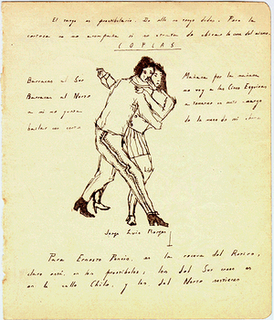
Esta página de Borges con una pareja bailando tango no es parte de los manuscritos robados, pero la pongo para que conozcan su letra. Por si a alguien le ofrecen en la Cachina un documento un tanto sospechoso.
Dos manuscritos de Borges --nada menos que los de "Pierre Menard, autor del Qujote" y "La biblioteca de Babel"-- han desaparecido de la librería Lame Duck Books, en Cambridge (Mass.). Su catálogo on-line todavía ofrece ambos manuscritos, el primero a US$ 450 000, y el segundo a $500 000, pero supongo que pronto serán retirados. Solo puedo decir que alguien se me adelantó.
Felizmente, todavía está en esa librería el manuscrito de "El jardín de senderos que se bifurcan", a US$ 450 000.
Detalles sobre los manuscritos y cuando fueron vistos por última vez, en este mensaje:
During packing after the Hamburg Antiquarian Book Fair (Quod libet) Sunday 12 November, 2006, in transit to our shop in Cambridge, MA, or sometime during Thursday, 16th November 2006 -- possibly during an exhibitors' party the day before the Boston Antiquarian Book Fair held at our bookshop and art gallery, two precious modern literary manuscripts went missing. The last time I can recall seeing them was during the packing of my stand at the Hamburg Book Fair (Quod libet) between 6-7:15 PM (German time). It was discovered that they were missing when we wished to show them to a guest at the party on the 16th at approximately 8:30 PM.I would very much appreciate any guidance members might be able to provide as to lost/stolen book/art sites when these items might be registered. Of course, I'd also welcome any other pertinent advice.Sincerely,
John WronoskiThe descriptions follow.BORGES, Jorge Luis. Working Manuscript of the Story, "La biblioteca de Babel." c. 1940. Eight small quarto (9" x 6 1/2") sheets and one smaller (truncated) sheet, removed from a ledger notebook. A splendid manuscript, showing numerous excisions, corrections and additions. A bravura performance, which first appeared in book form in that anthology of bravura performances, El jard̮ de senderos que se bifurcan. An early version was published as an essay in Sur under the title "La biblioteca total." Like all the pieces eventually included in the epochal volume Ficciones, "La biblioteca de Babel" is simultaneously whimsical and menacing, hilarious and terrifying. Characterized by its narrator as a "pointless and verbose epistle," it is a parable of the impossibility of coherence and the unknowability of God. Set in a vast, perhaps infinite, library, which contains, in a complex of interlocking hexagons, every book that could conceivably exist in every conceivable language-to be precise, it contains every possible arrangement of the "twenty-five orthographic characters," the letters of the alphabet, the comma, the period, and the space. While this total is bogglingly vast, it is also finite. This dystopian world, simultaneously fanatically rigid and hopelessly chaotic, has long been plagued by schisms and despair. Though filled on occasion with giddy, millennial hope, it seems to have grown increasingly empty, and now appears to have been all but abandoned. Richly autobiographical in detail, "La biblioteca de Babel" is at once a poised, and by no means overly subtle, critique of the pretensions of twentieth century literary culture, and a melancholy reflection on Borges's own severely constricted life. The objects of the story's rueful satire are not difficult to discern: totalitarianism, the cult of Joyce, surrealism, and the Ultraism of his own youth; but also Oulipo, which had yet to be invented and which would seem, it fact, to have been inspired by the story; making it a charming illustration, of course, of the library's governing principle. Anyone interested in bibliography and textual criticism will find their concerns addressed in a manner both comforting and mocking. Borges's first important story, and after all, perhaps the single story that remains most famous in his opus, somehow akin to the position of Die Verwandlung in the work of Kafka. In the comparison of the universe to a library, Borges's imaginary world has resonated in the profoundest way with his constituency -- readers. Of course, he was in fact a librarian himself for a significant period in his life, so perhaps, also like Kafka, he merely wrote the world in the peculiar way that he lived it, at least in this instance. This is the only known manuscript version of this iconic work of twentieth century culture. Very few literary manuscripts of this stature in any language remain in private hands. $500000BORGES, Jorge Luis. Manuscript of the Story "Pierre Menard, autor del Quijote." c. 1940. Eleven pages, removed from a ledger, the same notebook, presumably, from which the manuscripts of El jardin and La biblioteca de Babel, also offered here, were removed. A late state of the manuscript, but with a fair number of corrections, and several more significant insertions. One of the most intellectually compelling ficciones in Borges's opus, the astonishing narrative of the creation of a fragment of Don Quixote by means of the author's re-living Cervantes's life, and the no less astonishing critical appraisal of the achievement that finds in the work a texture, depth and poignancy that cannot inhabit the original for reasons of the differential conditions of compostion. One of the greatest Borges stories of all. $450000John Wronoski
Lame Duck Books
12 Arrow Street
Cambridge, MA 02138
USA
Tel: 1-617-868-2022
Fax.1-617-868-2023
http://www.lameduckbooks.com/ <http://www.lameduckbooks.com/>